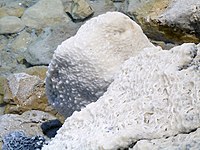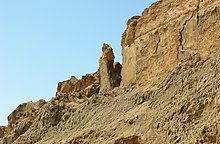Genesis narrative
Salt deposits beside the Dead Sea
"Lot's Wife" pillar, Mount Sodom, Israel.
The 'Lot's wife' sea-stack, Marsden Bay, South Shields, North East England, United Kingdom located on the North Sea coast
Composition
The Hebrew verb used for Lot's wife "looking" back is תבט, tāḇeṭ. Her looking back at Sodom differs in word usage to Abraham "looking" שקף, šāqap toward Sodom in (18:16).[2]:49Pillar of salt
The story appears to be based in part on a folk legend explaining a geographic feature.[3]A pillar of salt named "Lot's wife" is located near the Dead Sea at Mount Sodom in Israel. The Mishnah states that a blessing should be said at the place where the pillar of salt is.[1]:467 Other pillars are said to be at the crossing of the Red Sea as well as at the Wall of Jericho.[1]:467[4]
The Jewish historian Josephus claimed to have seen the pillar of salt which was Lot's wife.[5] Its existence is also attested to by the early church fathers Clement of Rome and Irenaeus.[6]
Jewish commentaries
In Judaism, one common view of Lot's wife turning to salt was as punishment for disobeying the angels' warning. By looking back at the "evil cities" she betrayed her secret longing for that way of life. She was deemed unworthy to be saved and thus turned to a pillar of salt.[7]Another view in the Jewish exegesis of Genesis 19:26, is that when Lot's wife looked back, she turned to a pillar of salt upon the sight of God who was descending down to rain destruction upon Sodom and Gomorrah.[1]:467 One reason that is given in the tradition is that she turned back to look in order to see if her daughters, who were married to men of Sodom, were coming or not.[1]:467
Another Jewish legend says that because Lot's wife sinned with salt, she was punished with salt. On the night the two angels visited Lot, he requested that his wife prepare a feast for them. Not having any salt, Lot's wife asked her neighbors for salt, which alerted them to the presence of their guests, resulting in the mob action that endangered Lot's family.[1]:467
In the Midrash, Lot's wife's name is given as Edith.[1]:466
Islamic view
Lut (Arabic: لوط) in the Quran is considered to be the same as Lot in the Hebrew Bible. He is considered to be a messenger of God and a prophet of God.[8]In Islamic tradition, Lot (Lut, Arabic: لوط) lived in Ur and was a nephew of Ibrahim (Abraham). He migrated with Abraham to Canaan and was commissioned as a prophet to the cities of Sodom and Gomorrah.[9] He was commanded by Allah to go to the land of Sodom and Gomorrah to preach monotheism and to stop them from their lustful and violent acts. Lot's messages were ignored by the inhabitants, prompting Sodom and Gomorrah's destruction. Though Lot left the city, his wife looked behind and was destroyed.[9]
In the Quran, surah (chapter) 26 Ash-Shu`arā' (The Poets) –
So, We saved him and his family, all. Except an old woman among those who remained behind.
Commentary: This was his wife, who was a bad old woman. She stayed behind and was destroyed with whoever else was left. This is similar to what Allah says about them in Surat Al-A`raf and Surat Hud, and in Surat Al-Hijr, where Allah commanded him to take his family at night, except for his wife, and not to turn around when they heard the Sayhah as it came upon his people. So they patiently obeyed the command of Allah and persevered, and Allah sent upon the people a punishment which struck them all, and rained upon them stones of baked clay, piled up.



No comments:
Post a Comment